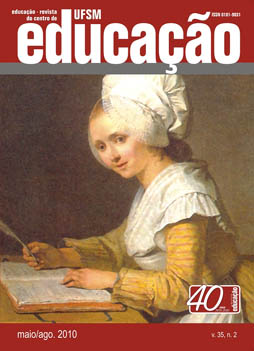Education: between subjectification and singularity
DOI:
https://doi.org/10.5902/198464442073Keywords:
Ideology, Singularity, Education.Abstract
This article takes up the problematization of ideology to think about the ideological dimension of education. It begins from a discussion of the theme of ideology in the context of the Marxist thinking, via Marx, Gramsci and Althusser. In another reference, it seeks for the input of a phenomenological description from Sartre, exploring the relationship of the concept of “bad faith” to ideology. Then, in another paradigm, different from the philosophy of consciousness, the notion of production of subjectivities is explored, especially from Guattari, but also with the support of Deleuze and Foucault. In this context, the ideology is treated as a process of subjectification, of social construction and machinic construction of subjectivities. The possibilities of both resistance and creation, as lines of flight, are operated at the end, around the idea of singularity, facing the challenge of thinking and producing processes of singularization in educational instituions.Downloads
How to Cite
Issue
Section
License
Declaration of originality
We declare that all articles present in the journal Educação (UFSM) are originals and were not submitted for publishing on any other publication, as a whole or a fraction. We also declare that, after being published by Educação (UFSM), a paper will not be submitted to another journal within two years. After this time, our journal transfers the publishing rights to the authors, with a permit granted by the Editorial Council.
We also acknowledge that the originals’ submission to Educação (UFSM) implies on a transference of copyright for physical and digital publishing to the journal. In case of noncompliance, the violator will receive sanctions and penalties predicted by the Brazilian Copyright Protection Law (n. 9610, dated 19/02/98).
Attribution 4.0 International (CC BY 4.0)
This license lets others remix, transform, and build upon the material for any purpose, even commercially, and copy and redistribute the material in any medium or format.

This work is licensed under a Creative Commons Attribution 4.0 International (CC BY 4.0)






